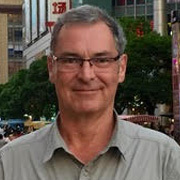
John Hyde
In 2016 television producer, showrunner and director John Hyde was in the most urbanised nation on earth, making two Futuropolis documentaries about Singapore’s ambitious blueprint for its future, including expansion upwards and seawards to accommodate a growing population. Life in Vertical Cities and Life at Sea explore themes Hyde has canvassed throughout his long career in television: the interplay between humans and the natural world.
Hyde was born into a farming family in the Lindis Pass area, and educated in Christchurch, attending Christ's College and Canterbury University. Keen on art, photography and history, he was drawn to Ilam arts school. After graduating Hyde went looking for a way into television and was advised by cameraman Keith Hawke to "get into the cutting room". In 1980 he started working as an editor for TVNZ at Avalon Studios, and was soon cutting everything from current affairs to Fair Go and Country Calendar.
Drawn to directing, Hyde "wrangled" a job as field director on a story about a visit by US President Jimmy Carter. "Bits and pieces" of directing work followed, including pieces for iconic music show Radio With Pictures.
By 1984 the travel bug was biting, so Hyde put together a showreel and sent it off to the BBC. Editor Michael Hacking, who had worked in England, suggested Hyde apply for jobs in the UK summer, when gaps needed to be filled. Competition was hot, with over 200 editors and 350 assistants vying for work. Hyde worked as an editor and dubbing editor on a variety of BBC productions, from documentary slots Arena and Omnibus to drama Buddy. In 1988 he was nominated for a BAFTA award for his sound editing on John Le Carre adaptation A Perfect Spy. The late 80s proved a vibrant time for British TV drama; Hyde worked at Ealing Studios, one of the oldest film studios in the world.
Hyde returned to New Zealand for a wedding. But "the thrill of eating tomatoes that actually tasted like tomatoes, and lettuces that tasted like lettuces" got to him. Asking around for work, he was soon back in Christchurch, writing and field directing items for TVNZ science series Fast Forward. In 1990 he directed the outside broadcast unit covering the shooting event at the 1990 Auckland Commonwealth Games.
Hyde took on a field director role with Natural History New Zealand in 1989, when it was still under the wing of TVNZ. He would go on to direct and produce a wide variety of series and documentaries for them. In 1997 the Natural History Unit was sold to Fox Studios, and later became the internationally successful Natural History New Zealand. This evolution meant that Hyde could work on "big, interesting, well budgeted" projects and from 1990 his work as a director and producer would be seen increasingly widely. His credits throughout the 90s and early 2000’s explore stories close to home like Flopsy, Mopsy Cottontail and Pete, which explored a High Country rabbit explosion, and producing Swanndris and Bow Ties, about NHNZ's inaugural Festival of Nature Films in Dunedin.
Hyde was director and producer for documentary A Consuming Passion- An Unofficial History of the Americas’ Cup, and rates it as a highlight. “I was working with cameraman John Toon, who was a passionate sailor. We met some fascinating people." Hyde vividly recalls Australia ll skipper John Bertrand "recounting every tack and wind-shift on that final race of the 1983 Cup”.
In the mid 90s Hyde was producer and editor on Mount Cook - Footsteps to the Sky, a TVNZ documentary celebrating New Zealand’s highest mountain. Directed and shot by Mike Single for the centenary of the first ascent, the documentary and its spectacular footage won a clutch of international awards, including main prize at the 1997 Czech Republic International Mountaineering Film Festival and awards for Best Mountaineering Film at both a Spanish festival of Mountain and Adventure Films and Italy's Festival of Mountain and Exploration Films.
Hyde has made several gliding documentaries with gliding expert Gavin Wills. “Gavin opened up a new universe to me," says Hyde, "the world of weather and meteorology." In the late 90s Hyde produced, edited and co-directed Wind Born - A Journey into Flight, which followed Wills as he taught his daughter how to glide. The process saw Hyde in a helicopter alongside a glider equipped with cameras, sweeping over the Southern Alps. Again the results attracted overseas attention, with a Silver Edelweiss for Best Mountain Sports Film at the 1997 Mountain Film Festival in Torello, Spain, and the Eastman Kodak Prize at Austria's International Mountain and Adventure Film Festival.
Throughout the early 2000s, Hyde continued to produce and/or direct many nature and science-based documentaries and series, which screened to international audiences: among them were Horse Tales for Animal Planet, and Siberian Survivors - A Tale of Two Foxes, a Discovery documentary set on a Russian offshore island. The latter documentary won the Grand Prix at the 2003 Matsalu Nature Film Festival in Estonia.
Hyde turned his camera back home — and to NHNZ — as series producer and director for Wicked Weather, which explored Aotearoa's fickle weather patterns. It was nominated for Best Documentary or Factual Series at the 2006 Air NZ Screen Awards.
Since 2015 Hyde has been an Executive Producer for NHNZ, working on documentary projects for a range of international networks. Unconventional and massive man-made structures feature in such programmes as Eco-Ark Taiwan and Inside Dubai Racecourse. Hyde has also executive produced several Mega- Structure documentaries. In 2014 and 2015 he executive produced three seasons of Abalone Wars for channel Discovery Asia, following the risky search for abalone in and around Australian waters.
Profile written by Gabe McDonnell
Sources include
John Hyde
'Mount Cook - Footsteps to the Sky' (Television Documentary) NZ On Screen website. Director Mike Single (Natural History New Zealand, 2004)
'Abalone Wars' NHNZ website. Accessed 25 April 2017